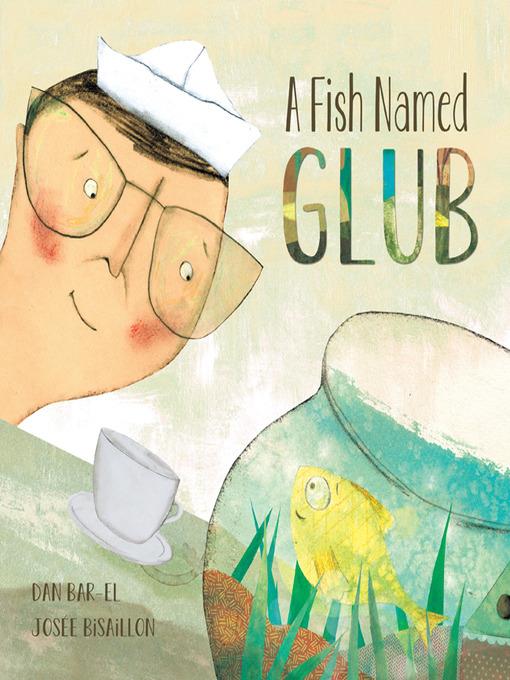
A Fish Named Glub
فرمت کتاب
ebook
تاریخ انتشار
2014
Lexile Score
490
Reading Level
0-2
ATOS
2.5
Interest Level
K-3(LG)
نویسنده
Josée Bisaillonناشر
Kids Can Press Ltd.شابک
9781771382052
کتاب های مرتبط
- اطلاعات
- نقد و بررسی
- دیدگاه کاربران
نقد و بررسی

February 3, 2014
Bar-el’s (Dream Boats) tale of a fish who changes the lives of the employees and patrons of a small diner has the scope of a novel. Like a small child, Glub learns about himself by echoing what he hears. His name comes from a girl’s exclamation—“Glub!” she shouts—and his first piece of self-knowledge comes from the girl’s mother, Jenny: “Leave that poor fish alone.” “Oh,” thinks Glub, “I am Glub, all alone.” With quiet humor, Bisaillon (Oh No, School!) shows the diner’s customers as a series of rear ends perched on stools, with Glub on the furthest one peering anxiously out at the world. Readers learn that grill cook Foster is sweet on Jenny, and wishes desperately for adventure and change; luckily (and unexpectedly), Glub possesses the power to show people their dreams, and he bestows his gift on Foster. While young readers may not be concerned with adult hopes and despairs, Bar-el’s lyrical prose and Glub’s underdog (underfish?) triumph offer entertainment for those who aren’t actively wondering what they’re meant to be doing with their lives. Ages 4–8. Illustrator’s agent: Morgan Gaynin Inc.

March 15, 2014
A lyrical story about life and its mysteries told from the point of view of a small fish living in a glass fishbowl in a diner. Eschewing the current picture-book trend of haiku-like brevity, Bar-el unhurriedly spins out his story with a delicate touch and gentle humor. Glub swims around in his glass bowl on the counter of the diner and ponders the big questions: "Who am I?" "Where do I come from?" "What do I need?" "What is a home?" Each of Glub's endearing ponderings are accompanied by Bisaillon's equally endearing double-page spreads that, in their sharp-edged execution and piquant style, contrast well with the innocence and expansiveness of Glub's musings. Glub answers his own questions by observing the conversations and behaviors of the people in his surroundings, and these answers build to reveal, in the end, the answer to the big puzzle. Although the overarching themes of dreams and love may not connect completely with very young readers, their adult read-aloud partners will very likely be charmed. A story that is as delightful in its individual parts as it is in its sweeping theme of dreams rediscovered and the small push of self-belief needed to follow them. (Picture book. 3-8)
COPYRIGHT(2014) Kirkus Reviews, ALL RIGHTS RESERVED.

April 1, 2014
K-Gr 3-Rendered in mixed media in warm hues, with stylized illustrations and an introspective philosophy, this story is about a fish who learns about how he ended up in his bowl at Foster G. Williker's diner. The rhyming text moves the story along as customers come in and out of the diner and stop to talk to Glub. As they offer tips for taking care of him, Glub shows them their memories and their dreams through fish bubbles, making even the most skeptical person happy. Eventually, Glub shows the diner's owner his true dream for happiness and even shares one of his own. Similar to Devin Scillian's Memoirs of a Goldfish (Sleeping Bear, 2010), this story will appeal to older children who grasp the power of dreams, hopes, and memories, while younger children will enjoy the antics of Glub and the people he meets during his time at the diner.-Melissa Smith, Royal Oak Public Library, MI
Copyright 2014 School Library Journal, LLC Used with permission.

April 15, 2014
Grades K-2 The tenant who lives upstairs of a nondescript diner moves and leaves behind a goldfish. Foster, who runs the diner, takes it downstairs. When a little girl makes Glub-glub! sounds at the bowl, the fish assumes Glub is his name. And while Glub looks ordinary, he wonders about everything. This charming allegory may be too old for the intended age group in some ways, but even little ones will respond to Glub's big questions: Who am I? What am I doing here? Where is home? Glub finds his own special talentblowing bubbles into the shapes of people's dreamswhich leads at least some of the people who frequent the diner to listen to their hearts. It takes Foster a little longer, but by book's end, both Foster and fish have dreams fulfilled. Artfully told, the story's melancholy edge is melted by the connections made between characters. The collage-style art charms with its childlike appeal that helps put the book right at the reader's level. This is a book to return to, with nuance adding to each reading.(Reprinted with permission of Booklist, copyright 2014, American Library Association.)

























دیدگاه کاربران